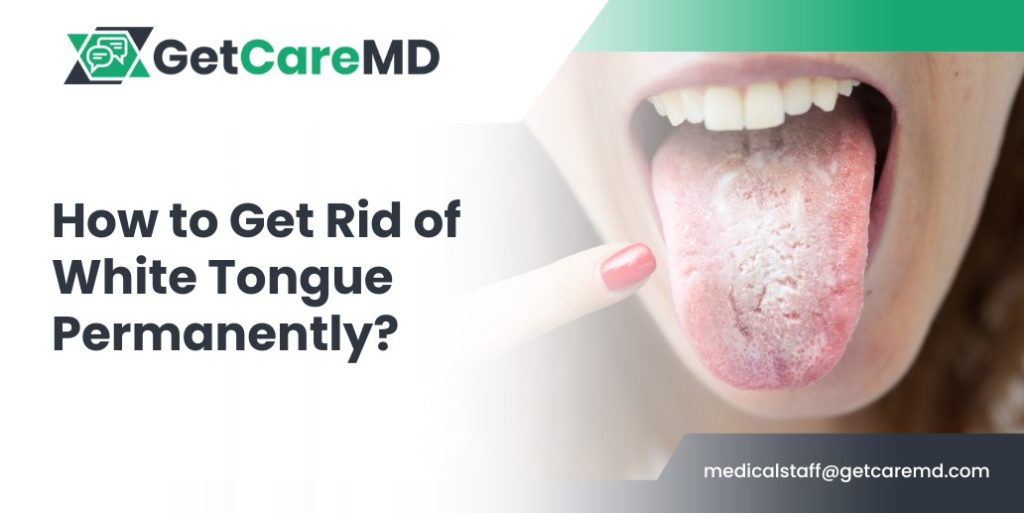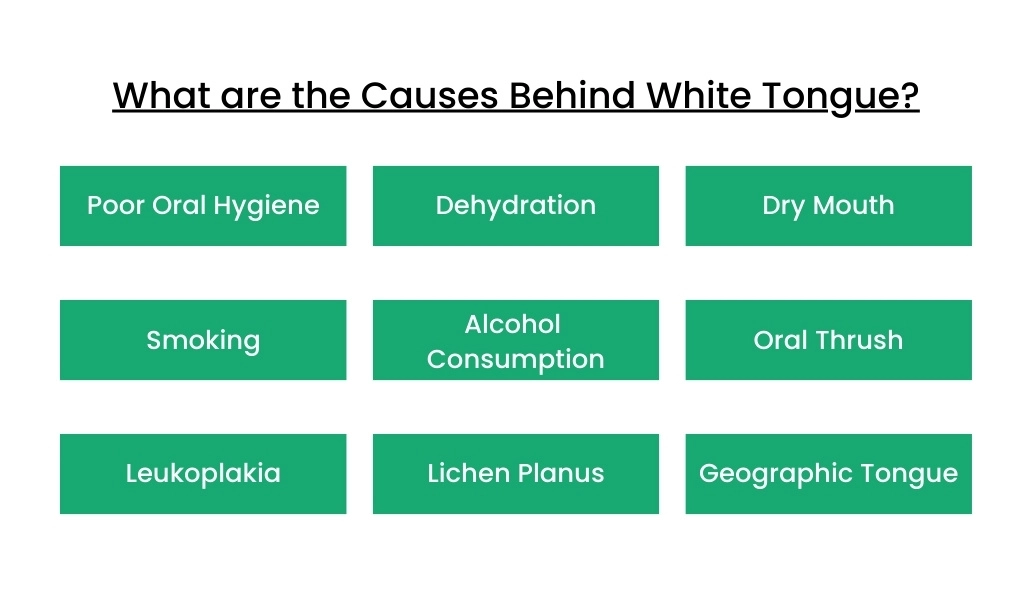A white tongue that is characterized by a white coating or patches on the tongue, can be a disconcerting sight and is often a sign of an underlying issue. Common among individuals of all ages, it can result from various factors such as poor oral hygiene, dehydration, dry mouth, smoking, or certain medical conditions.
This condition is particularly prevalent in people who smoke, have diabetes, are immunocompromised, or take antibiotics frequently. While it is usually harmless, a persistently white tongue can indicate more serious health concerns that require attention.
In this blog, we will explore effective strategies to get rid of a white tongue permanently, ensuring your oral health is at its best.
What is a White Tongue?
A white tongue is a condition where the tongue appears white due to a coating or patches on its surface. This coating is typically composed of debris, bacteria, and dead cells that accumulate between the small nodules on the tongue called papillae.
The appearance of a white tongue can vary, ranging from a light, thin coating to thicker, more noticeable patches. Although it may be alarming, a white tongue is often harmless and temporary, though it can sometimes indicate underlying health issues.
Does a White Tongue Mean You’re Sick?
A white tongue does not necessarily mean you are sick, but it can sometimes be an indicator of underlying health issues. In many cases, a white tongue is a benign condition resulting from factors such as poor oral hygiene, dehydration, or dry mouth.
However, it can also be a symptom of more serious conditions like oral thrush, leukoplakia, or lichen planus. While a white tongue on its own is usually not a cause for alarm, persistent discoloration accompanied by other symptoms, such as pain or difficulty swallowing, may warrant a visit to a healthcare professional for a thorough evaluation.
Understanding the context and associated symptoms is key to determining whether a white tongue is a sign of illness or a temporary, harmless condition.
What are the Causes Behind White Tongue?
A white tongue can stem from various causes, ranging from everyday habits to medical conditions. Understanding these causes is essential for identifying the appropriate treatment and ensuring optimal oral health.
Poor Oral Hygiene: Inadequate brushing and flossing can lead to a buildup of bacteria and debris on the tongue’s surface.
Dehydration: Insufficient water intake can cause dry mouth, leading to a white coating on the tongue.
Dry Mouth: Often a side effect of certain medications or medical conditions, dry mouth can contribute to the development of a white tongue.
Smoking: Tobacco use can irritate the tongue and lead to a white coating.
Alcohol Consumption: Excessive alcohol intake can dry out the mouth and cause a white tongue.
Oral Thrush: A fungal infection caused by Candida yeast, leading to creamy white patches on the tongue.
Leukoplakia: A condition marked by thick, white patches on the tongue and the lining of the mouth, often linked to irritation from smoking or alcohol.
Lichen Planus: An inflammatory condition that can cause white patches and sores in the mouth.
Geographic Tongue: A benign condition with map-like patches on the tongue that can appear white or light-colored.
White Tongue vs. Bumps on Tongue
Understanding the difference between a white tongue and bumps on the tongue is crucial for identifying the appropriate treatment and maintaining oral health. While a white tongue typically involves a coating or patches of white on the surface, bumps on the tongue can be indicative of different issues, ranging from harmless to potentially serious conditions.
| Aspect | White Tongue | Bumps on Tongue |
| Appearance | White coating or patches on the tongue’s surface | Raised, swollen, or red bumps on various parts of the tongue |
| Common Causes | Poor oral hygiene, dehydration, oral thrush, smoking | Irritation, infections, allergic reactions, canker sores |
| Symptoms | Dry mouth, bad breath, unusual taste | Pain, sensitivity, and discomfort while eating or speaking |
| Treatment | Improved oral hygiene, staying hydrated, antifungal medications | Identifying and avoiding irritants, topical treatments, salt water rinses |
| When to See a Doctor | If persistent or accompanied by pain or other symptoms | If persistent, painful, or affecting daily activities |
Care and Treatment
Treating a white tongue involves addressing the underlying causes and adopting effective oral hygiene practices. Simple lifestyle changes can often resolve the issue, but persistent cases may require medical intervention.
I. Maintaining Good Oral Hygiene
Regular brushing and flossing are crucial for preventing the buildup of bacteria and debris on the tongue. Using a tongue scraper or brushing the tongue gently with a toothbrush can help remove the white coating. Additionally, using an antimicrobial mouthwash can reduce bacterial growth and maintain a clean oral environment.
II. Staying Hydrated
Drinking plenty of water throughout the day helps keep the mouth moist and prevents dry mouth, which can contribute to a white tongue. Avoiding excessive caffeine and alcohol consumption, which can dehydrate the body, is also beneficial.
III. Quitting Smoking
Smoking irritates the tongue and can lead to a white coating. Quitting smoking not only improves overall health but also enhances oral hygiene and reduces the risk of developing a white tongue.
IV. Dietary Adjustments
Eating a balanced diet rich in vitamins and minerals supports overall oral health. Including foods high in vitamins A, B12, and iron can help prevent deficiencies that might contribute to a white tongue.
V. Using Antifungal Treatments
If a white tongue is caused by oral thrush, antifungal treatments such as lozenges, tablets, or mouthwashes prescribed by a healthcare professional can effectively clear the infection and restore normal appearance to the tongue.
VI. Regular Dental Check-ups
Regular visits to the dentist ensure that any oral health issues, including a white tongue, are identified and treated early. Dentists can provide professional cleanings and advice on maintaining optimal oral hygiene.
VII. Seeking Medical Advice for Persistent Cases
If the white tongue persists despite good oral hygiene practices, or if it is accompanied by pain or other concerning symptoms, seeking medical advice is important. A healthcare professional can diagnose any underlying conditions and recommend appropriate treatment options.
Home Remedies for White Tongue
If you are dealing with a coated tongue, there are several effective home remedies that can help restore your tongue to a healthy state. These remedies are easy to implement and can be incorporated into your daily routine to reduce the white coating and improve overall oral hygiene.
Here are some simple and natural home remedies for a coated tongue:
Saltwater Rinse: Gargling with warm salt water can help remove bacteria and debris from the tongue. Mix a teaspoon of salt in a glass of warm water and rinse your mouth twice a day.
Baking Soda Scrub: Baking soda has natural antibacterial properties. Mix a small amount with water to form a paste, and gently scrub your tongue with a toothbrush.
Oil Pulling: Swishing a tablespoon of coconut or sesame oil in your mouth for 10-15 minutes can help remove toxins and reduce the white coating on your tongue.
Probiotic Yogurt: Eating probiotic yogurt helps balance the bacteria in your mouth, which can reduce the white coating on the tongue. Aim for a serving of yogurt daily.
Aloe Vera Juice: Aloe vera has antimicrobial properties and can soothe the mouth. Rinse your mouth with aloe vera juice or drink a small amount daily.
Garlic: Chewing a clove of raw garlic daily can help combat oral bacteria due to its natural antifungal properties.
Turmeric: Mixing turmeric powder with lemon juice to form a paste and applying it to the tongue can help reduce white coating due to turmeric’s antibacterial properties.
Herbal Teas: Drinking herbal teas like peppermint or chamomile can soothe the mouth and reduce the appearance of a white tongue.
Does Mouthwash Help with White Tongue?
Using mouthwash can be beneficial in managing white tongues, as certain mouthwashes contain ingredients that help kill bacteria and fungi in the mouth, reducing the white coating on the tongue. Mouthwashes specifically formulated for treating white tongues often contain antibacterial and antifungal agents such as chlorhexidine or essential oils like tea tree oil.
These ingredients can help to remove bacteria and yeast from the tongue’s surface, promoting a healthier oral environment. However, it’s essential to choose a mouthwash that is specifically designed for treating white tongue and to use it as directed for optimal results.
While mouthwash can be a helpful addition to your oral hygiene routine, it should not be relied upon as the sole treatment for persistent white tongue, especially if it is caused by an underlying medical condition. Consulting with a healthcare professional is advised for proper diagnosis and treatment.
What Vitamin is Good for White Tongue?
One vitamin that is good for the white tongue is vitamin B12. Vitamin B12 deficiency can manifest as oral symptoms, including a pale or swollen tongue, which may contribute to the appearance of a white tongue. Increasing your intake of vitamin B12 through diet or supplements can help alleviate this deficiency and improve your tongue’s health.
Foods rich in vitamin B12 include meat, fish, eggs, dairy products, and fortified cereals. Additionally, vitamin B12 supplements are available for those who may have difficulty obtaining enough from their diet.
Ensuring adequate intake of vitamin B12 can help support overall oral health and reduce the likelihood of developing a white tongue.
Bottom Line
Getting rid of the white tongue permanently involves addressing underlying causes, adopting proper oral hygiene practices, and making necessary lifestyle adjustments. By implementing the strategies discussed in this article, such as maintaining good oral hygiene, staying hydrated, and seeking medical advice when needed, you can effectively manage and prevent the recurrence of the white tongue. Remember, consistency and diligence in oral care are key to achieving lasting results and maintaining optimal oral health.



